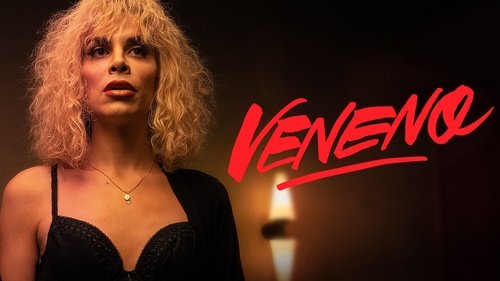
Danybur
10
|
Jul 11, 2021
(Español / English)
_**Una desafiante y arrolladora crónica del desamor / A defiant and overwhelming chronicle of heartbreak**_
Sumario
La serie es una atípica, arrolladora y conmovedora biopic de la mujer trans Cristina Ortiz, célebre personaje mediático español que surgió en los 90s, con una prodigiosa puesta en escena que recorre todos los géneros y que enlaza con mucha originalidad diversas líneas temporales. Es también una crónica de la gestación del libro en el que se basa, del coming of age de su autora y de la relación con su biografiada.
En una época donde las ficciones españolas se esmeran por volverse productos tan internacionales como impersonales, se agradecen la potencia narrativa y el gracejo profundamente andaluz de la serie, inseparable de su protagonista, una Veneno tratada siempre con un respeto y un infinito amor que los espectadores harán suyos.
Reseña
Veneno es la atípica biopic de Cristina Ortiz, personaje mediático trans que irrumpió en los realities de la TV española a mediados de los años noventa. Está basada en el libro Digo! Ni puta ni santa. Las Memorias de La Veneno, de Valeria Vegas.
Digo atípica por la originalidad y complejidad de su estructura narrativa, porque al mismo tiempo que describe (y en desorden) diferentes momentos de la vida de la protagonista, narra la relación de Cristina con su biógrafa Valeria Vegas (quien fuera un tímido adolescente varón estudiante de periodismo cuando se conocieron) y de la influencia que tuvo en su coming of age. Es decir, es también un making off del libro y del efecto de la movilización de los recuerdos de la protagonista que van produciendo las entrevistas entre ambas. Hay un juego de espejos entre ambas (con cierto vampirismo por parte de la periodista sobre su biografiada, como suele suceder) y los contrastes entre las diferentes épocas y contextos familiares y sociales en que les tocó crecer y vivir.
Habiendo podido recostarse cómodamente sólo en el costado escandaloso del personaje (algunas de sus entrevistas son reconstruidas con fidelidad), la película pinta a La Veneno de cuerpo entero, con sus luces y sombras, su actitud desafiante, su lengua feroz, sus muertes y resurrecciones mediáticas, sus entradas y salidas de la prostitución, la relación con sus pares, en particular con su amiga Paca la Piraña (quien se interpreta a sí misma) y con sus amantes y “maridos”. Crónica también del profundo daño causado por el desamor materno y la estigmatización en Adra, su pueblo natal en Almería y de la lenta metamorfosis del niño Joselito en la incipiente travesti (Jedet Sánchez), la exuberante prostituta trans de los 90s (Daniela Santiago) y la decadente y golpeada Veneno madura (Isabel Torres) y un testimonio del tránsito por un arduo camino de negación de derechos. La entrega de las tres actrices trans a su personaje es absoluta.
La prodigiosa puesta en escena de los realizadores Javier Calvo y Javier Ambrossi (“los Javis”) recorre y alterna prácticamente todos los géneros y climas: el drama, el melodrama desatado, la comedia, yendo del costumbrismo a la ironía o al naturalismo más descarnado. El gracejo con que se aborda su infancia como Joselito, por ejemplo, es tan delicioso como conmovedor.
La estructura narrativa va y viene en el tiempo, con enlaces sumamente originales entre las líneas temporales y las edades de los personajes. Y como toda memoria, se trata de un relato tamizado o adornado de a ratos por la fantasía de la protagonista.
En una época donde las ficciones españolas se esmeran por volverse productos tan internacionales como impersonales, se agradece la potencia narrativa y el gracejo profundamente andaluz de la serie, inseparable de su protagonista, una Veneno tratada siempre con un respeto y un infinito amor que los espectadores harán suyos.
A defiant and overwhelming chronicle of heartbreak
Summary
The series is an atypical, overwhelming and moving biopic of the trans woman Cristina Ortiz, a famous Spanish media character who emerged in the 90s, with a prodigious staging that crosses all genres and that links different time lines with great originality. It is also a chronicle of the gestation of the book on which she is based, of the coming of age of her author and of her relationship with her biography.
In an age where Spanish fictions strive to become products as international as they are impersonal, the series' narrative power and profoundly Andalusian grace are appreciated, inseparable from its protagonist, a Veneno always treated with respect and infinite love that viewers they will make theirs.
Review
Veneno is the atypical biopic of Cristina Ortiz, a trans media character who broke into Spanish TV reality shows in the mid-1990s. It is based on the book Digo! Neither whore nor saint. The Memories of La Veneno, by Valeria Vegas.
I say atypical because of the originality and complexity of its narrative structure, because at the same time that it describes (and in disorder) different moments in the life of the protagonist, it narrates Cristina's relationship with her biographer Valeria Vegas (who was a shy adolescent male student journalism when they met) and the influence it had on their coming of age. In other words, it is also a making off of the book and of the effect of the mobilization of the protagonist's memories that the interviews between them produce. There is a game of mirrors between the two (with a certain vampirism on the part of the journalist about her biography, as often happens) and the contrasts between the different times and family and social contexts in which they had to grow up and live.
The film paints La Veneno in full body, with her lights and shadows, her defiant attitude, her fierce tongue, her deaths and media resurrections, her entry and exit from prostitution, her relationship with her peers, in particular with her friend Paca the Piranha (who plays herself) and with her lovers and "husbands". It also chronicles the profound damage caused by maternal heartbreak and stigmatization in Adra, her hometown in Almería, and the slow metamorphosis of the child Joselito into the incipient transvestite (Jedet Sánchez), the exuberant trans prostitute from the 90s (Daniela Santiago) and the decadent and beaten Veneno Madura (Isabel Torres) and a testimony of the journey through an arduous path of denial of rights. The delivery of the three trans actresses to her character is absolute.
The prodigious staging of the directors Javier Calvo and Javier Ambrossi (“the Javis”) covers and alternates practically all genres and climates: drama, unleashed melodrama, comedy, going from manners to irony or to the most stark naturalism . The grace with which his childhood as Joselito is approached, for example, is as delicious as it is moving.
The narrative structure comes and goes in time, with highly original links between the timelines and the ages of the characters. And like all memory, it is a story sifted or adorned at times by the fantasy of the protagonist.
At a time where Spanish fictions strive to become products as international as they are impersonal, the series' narrative power and profoundly Andalusian grace are appreciated, inseparable from its protagonist, a Veneno always treated with respect and infinite love that viewers they will make theirs.



















